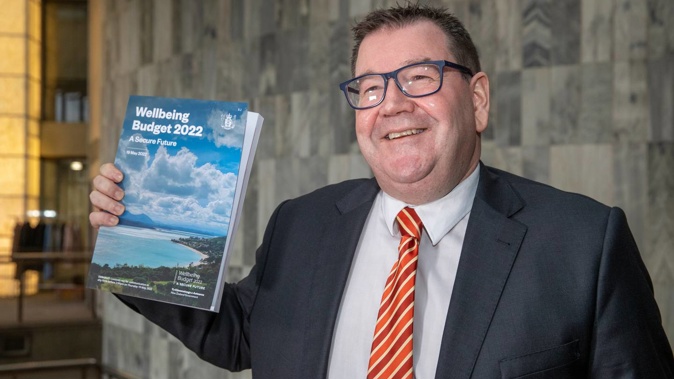
The Government lifts the lid on the 2022 Budget today, publishing a trove of behind-the-scenes document detailing how it was put together.
Herald political reporters have scoured these documents, bringing together the inside story of how the budget was made.
Ministers sought $64 billion in new budget spending
Ministers submitted more than 560 budget bids for the 2022 Budget, totalling $64 billion in operating spending and $9.2b in capital spending over the forecast period, according to budget documents released today.
Finance Minister Grant Robertson had to whittle those bids down to fit his $6b annual operating allowance for the four-year forecast period.
Every year, the finance minister invites bids for Budget funding. These are always well in excess of what the Government can actually fund and deliver. Ministers then trim these down to the initiatives that actually get funded in the Budget.
Robertson wrote to ministers saying the 560 bids were "far beyond the funding available and has required me to make early decisions to allow for an effective Budget process".
He asked ministers for help in reducing the number of bids down to a more manageable level.
Government warned payment would go to people overseas, deceased, and earning over $100K, Treasury fears it will be extended
Ministers were warned from the beginning the cost of living payment would be paid to deceased people, people overseas and high-income households.
In a paper from March 25, the earliest budget paper on the payment, officials also warned there would be pressure to extend the payment or to renew it and that there was a risk people would structure their incomes to claim the payment.
The Government was moving so fast to deliver the payment, and was so unsure about how much it would cost, that ministers asked for an extra $53 million in wriggle room just in case it went over its estimated budget.
"Inflation is expected to be widespread and persistent. This makes a one-off payment a poor mechanism for supporting households with a longer-term problem.
"Inflation being persistent may make it harder to ensure this payment remains a oneoff occurrence," Treasury warned.
/cloudfront-ap-southeast-2.images.arcpublishing.com/nzme/GPIEX63A54D5YOH7WZXPYYF4WE.jpg)
Finance Minister Grant Robertson on his way into the House on Budget Day with ministers, from left, David Parker, Andrew Little Megan Woods, and Peeni Henare. Photo / Mark Mitchell
Treasury recommended "caution with progressing such a significant policy in accelerated timeframes", saying there were "significant risks associated with designing this proposal at speed".
Treasury warned of a "small risk that the payment may be paid into the bank accounts of some people who are deceased, as IR does not always have immediate access to the data on who is deceased".
Treasury also said that some people receiving the payment would not have their eligibility criteria finalised until March 2023. It has emerged that 800,000 people expected to be eligible for the payment have not yet claimed it.
Officials said the payment was "not tightly focused on households with lower incomes".
"Preliminary distributional modelling shows that around a quarter of the payments will go to households with incomes in the top 30 per cent," officials said - these are households with a joint income of more than $100,000.
Advice said that because cost of living was leading to an "increase in hardship for a large number of lower-income households", but that the payment was "unlikely to be the best way to provide of support to those who are struggling the most".
"The proposed payment is not well targeted and would end up supporting a significant proportion of higher income households," Treasury said.
Elsewhere in the same paper, Treasury warned inflation would also hurt the Government's ability to deliver core services whilst keeping to its fiscal strategy - things like the government's debt target, revenue levels and spending levels.
"Higher inflation will increase the cost of delivering government services. This will put pressure on your ability to deliver services that meet public expectations while achieving your medium-term fiscal strategy," Treasury said.
In a later paper, from April 6, officials told the Government it estimated the payment would cost $747.6m, but $800 million will be sought from Cabinet because the estimated cost is subject to some uncertainty".
Officials also warned some people might "rearrange their incomes on their tax return to just below the income cap" just to claim the payment.
"We are unable to estimate this risk; however, those returns would be subject to normal integrity checks as part of the year end assessment," officials warned.
- Thomas Coughlan and Michael Neilson, NZ Herald
Take your Radio, Podcasts and Music with you









